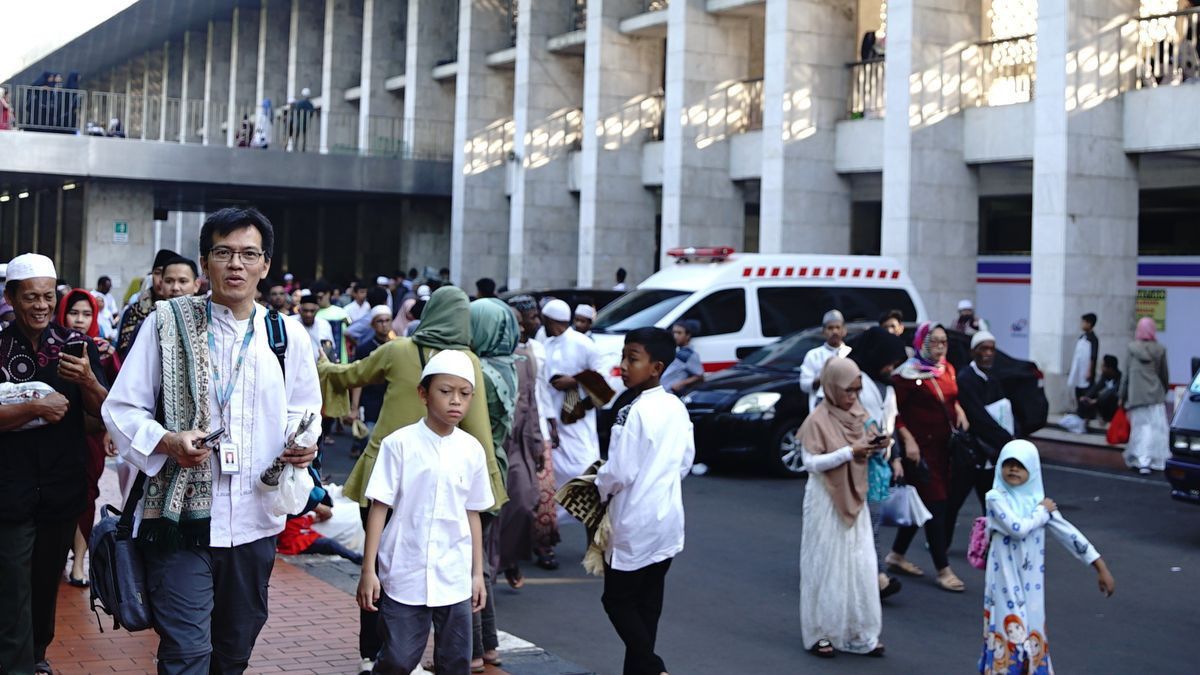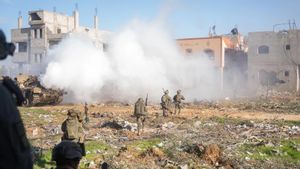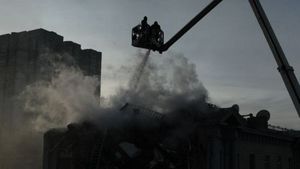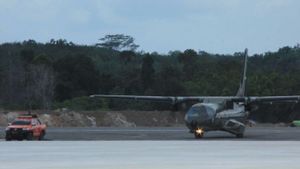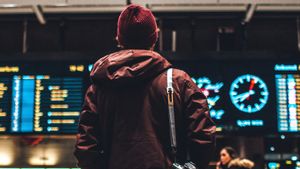JAKARTA - President Joko Widodo (Jokowi) said that the major renovation of the Istiqlal Mosque has reached 90 percent and will be completed soon. He admitted that this renovation was not completed as targeted because of the COVID-19 impact.
"I returned to the Istiqlal Mosque to check the progress of the major renovation of the Istiqlal Mosque. As of today it has been announced, (renovation, red) has been completed at least 90 percent and this major renovation will be completed in early July. It is a bit delayed due to the pandemic," he said. President Jokowi in a press conference broadcast on the YouTube account of the Presidential Secretariat after touring the mosque on Tuesday, June 2.
Despite saying that the mosque will be finished with renovations soon, Jokowi has yet to confirm whether this mosque will be opened to the public soon in the current situation. This decision, continued Jokowi, will be taken by the Grand Imam of the Istiqlal Mosque, Nasaruddin Umar.
It's just that, he has advised that all means in compliance with health protocols must be prepared. So, when worship is carried out, all people who attend the Istiqlal Mosque can be safe from transmission of COVID-19.
"I have prepared a health protocol so that later when we pray at the Istiqlal Mosque everything is safe from COVID-19. Because we know that not all provinces have yet to spread COVID-19 in Indonesia, we control the area," he said.
The former governor of DKI Jakarta also emphasized that the reopening of places of worship, economic activities, and teaching and learning activities in schools would of course be decided in strict and scientific-based stages. One of them, by paying attention to the spread curve of this virus through R0 and Rt.
It is known, R0 is the reproductive number or the potential for transmission of COVID-19 from person to person. The higher the reproductive rate of an infectious disease, the more contagious it will be. Vice versa.
Meanwhile, Rt or R effective is the reproductive rate that occurs after government intervention by implementing Large-Scale Social Restrictions (PSBB) or Kuncitara.
Returning to Jokowi, all this data is the basis for reopening activities in the community in the midst of the COVID-19 outbreak. "Everything uses rigorous scientific data, so we hope that it will run from stage to stage, sector to sector, province to province according to the figures I have previously conveyed," he said.
Previously reported, the Minister of Religion Fachrul Razi has issued a circular on the Guidelines for the Implementation of Religious Activities in Houses of Worship. In this circular, a number of rules of worship in places of worship are in such a way as to prevent the spread of COVID-19.
There are 11 obligations that must be implemented in every house of worship without exception. One of them is to shorten the time for religious activities in places of worship.
"Shorten the time of worship without reducing the provisions for the perfection of worship," said Fachrul when reading the 11 obligations of religious houses during the new norms which were broadcast on BNPB YouTube, Saturday, May 30.
In addition, the person in charge of places of worship or management is also obliged to supervise and implement the application of health protocols by the community, periodically disinfect places of worship, limit the number of doors or exits to facilitate the implementation and supervision of health protocols, and must provide hand washing facilities complete with water and soap and hand sanitizer at the door of the house of worship.
Not only that, they also have to make a statement letter stating that they are ready to implement the prescribed health protocols.
"Management or person in charge of places of worship is obliged to provide a temperature checking device at the entrance for all users of places of worship. If a user of a house of worship is found with a temperature above 37.5 degrees during two inspections with a five minute distance, he is not allowed to enter the house of worship," he said. .
Then, administrators of places of worship must apply distance restrictions by placing special marks on the floor or chairs with a minimum distance of one meter. They also have to make arrangements for the number of congregations and users of places of worship who gather at the same time. The goal is to make efforts to keep your distance easy.
"Managers or people in charge of places of worship are obliged to post an appeal for the implementation of health protocols in the area of places of worship in an easily visible place," said Fachrul.
For people who come from outside the house of worship, the manager must apply a special health protocol for them.
As for socio-religious activities such as marriage contracts and marriages, Fachrul continued, a number of rules that must be followed are to ensure that all those present are healthy and negative for COVID-19 and that meetings are held in the minimum possible time.
"And limit the number of participants who attend a maximum of 20 percent of the room capacity and no more than 30 people," he said.
Who may worship in a house of worship in the new normal?Minister of Religion Fachrul explained the criteria for people to be allowed to worship in places of worship in the midst of new norms later. First, the people must be in a healthy condition. Furthermore, they must also worship in a place of worship that already has a COVID-19 safe certificate from the authorities.
"(The people) use masks or face masks since leaving the house and while they are in the area of the house of worship," said Fachrul.
Then, those who carry out religious activities in places of worship must be sure to wash their hands frequently with soap or hand sanitizer. The congregation must also obey the rules of maintaining a safe distance and not making physical contact such as shaking hands or hugging.
"Avoiding staying for a long time in a house of worship or gathering in the area of a place of worship other than for the purpose of compulsory worship," he said.
Furthermore, he also prohibits children or elderly people who are vulnerable to high exposure to worship in places of worship in order to prevent the risk of contracting this virus. He also asked all people in places of worship to care for the implementation of health protocols in places of worship according to the provisions.
The places of worship that are allowed to carry out religious activities are those that show a transmission rate (Ro) and a supporting Effective Reproduction Number or Rt number as well as an area that is confirmed to be free of COVID-19.
Supporting this fact, said the Minister of Religion, could be obtained from the Covid-19 Prone House of Worship Certificate from the Chairperson of the Task Force for the Acceleration of Handling for Provinces and districts, cities, sub-districts according to the level of the house of worship in question.
This letter is also not only issued directly but will also be coordinated first with Forkompida and religious councils and related agencies in their respective regions.
"This certificate will be revoked if in its development there are cases of transmission in the place of worship or there is disobedience to the applicable protocol," he said.
This sanction, he said, was deliberately given so that administrators of places of worship remained proactive and responsible for enforcing discipline. "Houses of worship must be the best example of preventing the spread of COVID-19," he concluded.
The English, Chinese, Japanese, Arabic, and French versions are automatically generated by the AI. So there may still be inaccuracies in translating, please always see Indonesian as our main language. (system supported by DigitalSiber.id)
